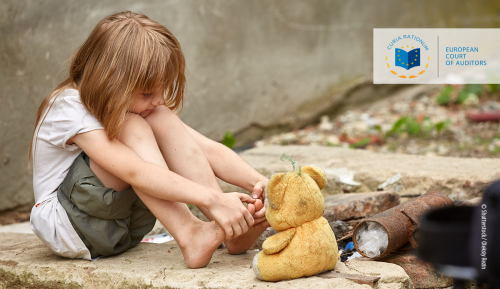
https://www.eca.europa.eu/en/Pages/NewsItem.aspx?nid=14139
https://www.eca.europa.eu/en/Pages/DocItem.aspx?did=54614
It is almost impossible to assess how the EU contributes to Member States’ efforts to reduce child poverty, according to a new report from the European Court of Auditors (ECA). The relevance and strength of EU instruments examined are limited because they are not legally binding – and more powerful tools, such as the European Semester or support from EU funds, rarely address child poverty specifically. It is thus difficult to determine whether EU action contributes effectively to efforts to tackle this important concern, say the auditors.
Almost one in four children in the EU is at risk of poverty or social exclusion. Yet studies have shown that the economic benefits of investing in children significantly outweigh the initial financial costs. In the EU, the fight against child poverty lies in the hands of each Member State. The European Commission’s role is to complement and support national child poverty actions through both legal and financial instruments. The auditors sought to assess how effectively EU action using these tools has contributed to Member States’ efforts.
“Child poverty remains a serious issue in the EU which is not conducive to a sustainable, inclusive and fair society. Unfortunately, child poverty is likely to become even more prevalent in the aftermath of the ongoing COVID-19 crisis”, said Tony Murphy, the Member of the European Court of Auditors responsible for the report. “It is therefore imperative that future EU funding and policy initiatives for tackling child poverty are based on reliable information to ensure a positive impact on the level of child poverty in the EU.”
Child poverty remains a serious issue in the EU with almost one out of four children at risk of poverty or social exclusion. Studies have repeatedly highlighted that investing at a relatively low financial cost during childhood can yield a lifetime of gains.
We decided to carry out this audit as the fight against child poverty remains a challenge across many Member States. Our objective was to determine whether the Commission had made an effective contribution to Member States’ efforts to reduce child poverty.
We found that the relevance of the Commission’s non-legally binding instruments is limited by nature, but it has more powerful tools at its disposal. However, the lack of available information directly related to child poverty means their effective contribution to Member States’ efforts to reduce child poverty was difficult, if not impossible, to assess.










Add new comment